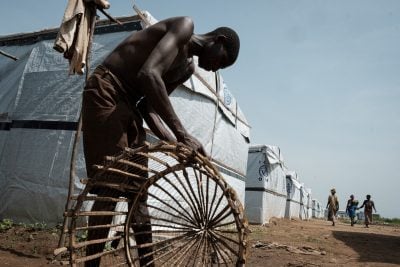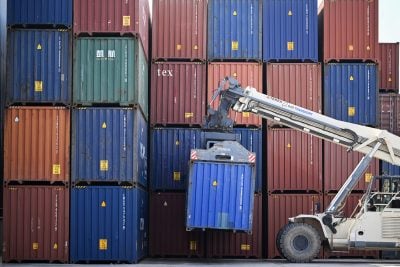Nigeria’s closure of the Benin border to curb the smuggling of illicit goods has blocked a vital West African trade artery and is chipping away regional integration. David Luke and Gerald Masila untangle the trade dispute and pose solutions following a recent fact-finding mission to the border area.
On 21 August this year, the Seme-Krake border between Nigeria and Benin was closed without warning as part of a Nigerian border crackdown on smuggling from Benin.
Longest border closure in years
As the border remains closed, vegetables are rotting, as queues of lorries are choking up checkpoints on each side. While border closures are a familiar sight at Seme-Krake, this is reported to be the longest closure in about forty years, with no end in sight.
The prolonged closure reflects deep fractures in cross-border trade relations. The cracks at Seme-Krake are particularly damaging since the border feeds the ECOWAS Abidjan-Lagos Corridor.
Nigerian authorities standing guard at the border say the closure is intended to stem the flow of illicit goods smuggled from Benin, which is compromising Nigeria’s agricultural trade, job creation, revenue collection and security.
The issue of rice smuggling is particularly contentious, with Africa’s fastest growing staple featuring first on Nigeria’s long list of contraband goods. While Abuja has made sweeping investments in developing rice production, officials say these efforts are undermined by smuggling from Benin.
Rice smuggled from Benin comes from outside the ECOWAS region, so it fails to meet the rules of origin to qualify for duty-free goods. Beninois smugglers also make a killing by importing rice at cheaper rates than Nigeria, and then selling it below market price in the Nigerian market.
A single trip to the Seme-Krake border and its surrounding trade routes confirmed that smuggling is a very real problem that requires targeted action. The blanket closure of the border to all trade, however, is not the answer.
Chipping away regional integration
This is because, since the establishment of ECOWAS in 1975, the region has made significant strides in regional integration. The 15 ECOWAS member countries have become one interdependent system, meaning the Seme-Krake border closure has significant knock-on effects.
First, the border closure blocks the trade of all goods, not just contraband such as rice, tomatoes and frozen poultry. Trucks entering Nigeria need to comply with ECOWAS conventions, which require all goods to be containerised and sealed at the point of origin until the final destination.
The Nigerian government has kept its seaports and airports open for non-contraband imports, as they have scanning facilities to inspect all imported goods. But this is not a realistic alternative for most traders.
Key staple agricultural commodities such as maize, wheat and cassava, which qualify for duty-free status within ECOWAS, are therefore no longer being traded in either direction.
This has hit incomes and food security. It also undermines the very foundations of the ECOWAS trade scheme – for the duty-free flow of goods throughout member countries.
The visit to Seme-Krake confirmed that the majority of trucks piled up at Benin checkpoints are laden with goods that are neither contraband nor imported from outside Benin. One female trucker with 9 seized coconut trucks complained that her cargo had been detained for two months, creating huge costs and unrecoverable losses.
Hitting agro-processing
Secondly, regional integration has nurtured cross-border regional value chains. Much of Nigeria’s imports from Benin are raw agricultural goods, some of which are used to feed Nigeria’s growing agro-processing industry.
This means that the land border closure may serve to defeat its main objective of supporting agro-industry and employment. It could also hit productivity and raise costs in the agro-processing sector. The only option is to re-route trade to seaports or airports, which also drives up production costs for Nigerian industries.
Indelible imprint
Thirdly, hard border infrastructure hides the strong and indelible links and bonds between border communities on either side of Seme-Krake. This has given rise to a micro-economy that thrives on informal cross border trade. This trade is small-scale, fluid and not subject to official border crossing procedures.
Unlike large consignments of formal trade, women moving with heavy loads of plantain and fabrics on their heads still cross the border. But today, the time taken to cross the border has more than doubled, and seen harassment by customs officials ramped up.
Rolling out the recently piloted ECOWAS National Biometric Identity Cards to all cross-border communities would help to identify traders originating close to the borders, who may not have passports or other official means of identification.
Nigeria shooting itself in the foot
As the biggest supplier of traded goods along the Abidjan-Lagos corridor, the closure of the Seme-Krake border has cut off the origin and supply of many semi-processed and manufactured products to cross-border markets in Benin, Togo, Ghana and Cote d’Ivoire.
The United Nations Economic Commission for Africa (ECA), African Export Import Bank (AFREXIMBANK) and Eastern Africa Grain Council (EAGC) are currently collecting data on the impact of the Seme-Krake border closure on volumes and prices of goods traded both informally and formally along the corridor.
If Nigeria’s land borders are not re-opened soon, its neighbouring countries may look to alternative suppliers to fill the gaps created by the closure. If this happens, even when the border re-opens, it may be too late for Nigerian suppliers to regain their market share.
While smuggling along unofficial trade routes has significantly reduced, it has come at a huge cost for regional trade.
What’s the solution?
Nigeria’s government are urging Benin to sign an agreement committing not to import goods that are onwardly smuggled. But enforcing such an agreement requires the costly deployment of security forces along both seams of the porous border.
A more cost-effective solution, and one in the spirit of furthering regional integration, would be to fully implement the common ECOWAS External Tariff enforce in 2015. This would make all goods imported from abroad subject to the same tariffs, and would go a long way in eliminating the gaping price disparities that incentivise smuggling.
At the same time, governments must continue to invest heavily in transforming agriculture by boosting local production and competitiveness. This will remove the need to resort to trade policy measures to remain competitive.
Finally, the cracks at the Seme-Krake border have surfaced due to much deeper frictions in the implementation of ECOWAS trade policy. For the smooth functioning of the ECOWAS Trade Liberalisation Scheme (ETLS), the Nigerian and Beninois customs authorities must cooperate to enforce the scheme, including through joint operations at the border.
For the launch of trade in the African Continental Free Trade Area (AfCFTA) from 1st July 2020 to work, strong political commitment and reliable institutional arrangements to keep the continent’s 107 land borders open will be critical.
David Luke is the Coordinator of the African Trade Policy Centre at the United Nations Economic Commission for Africa, based in Addis Ababa, Ethiopia
Gerald Masila is the Executive Director of the Eastern Africa Grain Council, based in Nairobi, Kenya
Want to continue reading? Subscribe today.
You've read all your free articles for this month! Subscribe now to enjoy full access to our content.
Digital Monthly
£8.00 / month
Receive full unlimited access to our articles, opinions, podcasts and more.
Digital Yearly
£70.00 / year
Our best value offer - save £26 and gain access to all of our digital content for an entire year!
 Sign in with Google
Sign in with Google 


